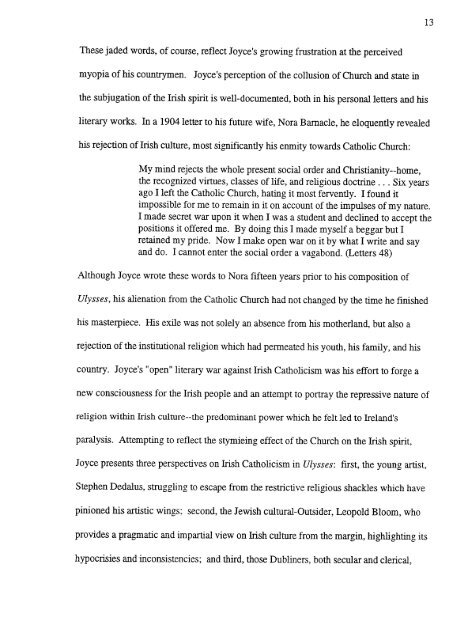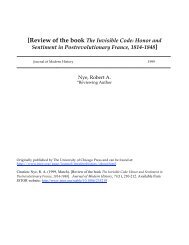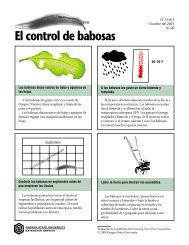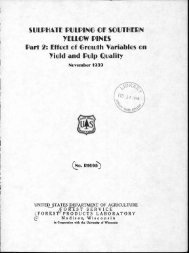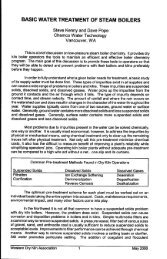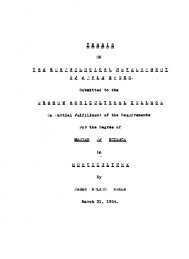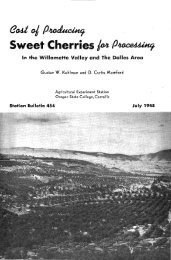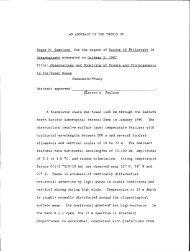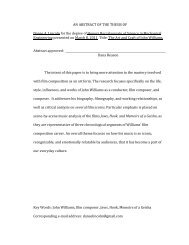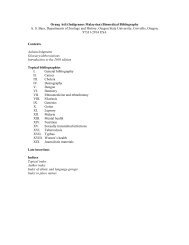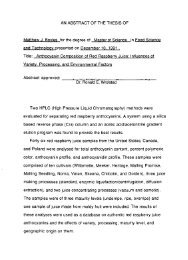Faubourg Saint Patrice - ScholarsArchive at Oregon State University
Faubourg Saint Patrice - ScholarsArchive at Oregon State University
Faubourg Saint Patrice - ScholarsArchive at Oregon State University
Create successful ePaper yourself
Turn your PDF publications into a flip-book with our unique Google optimized e-Paper software.
These jaded words, of course, reflect Joyce's growing frustr<strong>at</strong>ion <strong>at</strong> the perceived<br />
myopia of his countrymen. Joyce's perception of the collusion of Church and st<strong>at</strong>e in<br />
the subjug<strong>at</strong>ion of the Irish spirit is well-documented, both in his personal letters and his<br />
literary works. In a 1904 letter to his future wife, Nora Barnacle, he eloquently revealed<br />
his rejection of Irish culture, most significantly his enmity towards C<strong>at</strong>holic Church:<br />
My mind rejects the whole present social order and Christianity--home,<br />
the recognized virtues, classes of life, and religious doctrine . . . Six years<br />
ago I left the C<strong>at</strong>holic Church, h<strong>at</strong>ing it most fervently. I found it<br />
impossible for me to remain in it on account of the impulses of my n<strong>at</strong>ure.<br />
I made secret war upon it when I was a student and declined to accept the<br />
positions it offered me. By doing this I made myself a beggar but I<br />
retained my pride. Now I make open war on it by wh<strong>at</strong> I write and say<br />
and do. I cannot enter the social order a vagabond. (Letters 48)<br />
Although Joyce wrote these words to Nora fifteen years prior to his composition of<br />
Ulysses, his alien<strong>at</strong>ion from the C<strong>at</strong>holic Church had not changed by the time he finished<br />
his masterpiece. His exile was not solely an absence from his motherland, but also a<br />
rejection of the institutional religion which had perme<strong>at</strong>ed his youth, his family, and his<br />
country. Joyce's "open" literary war against Irish C<strong>at</strong>holicism was his effort to forge a<br />
new consciousness for the Irish people and an <strong>at</strong>tempt to portray the repressive n<strong>at</strong>ure of<br />
religion within Irish culture--the predominant power which he felt led to Ireland's<br />
paralysis. Attempting to reflect the stymieing effect of the Church on the Irish spirit,<br />
Joyce presents three perspectives on Irish C<strong>at</strong>holicism in Ulysses: first, the young artist,<br />
Stephen Dedalus, struggling to escape from the restrictive religious shackles which have<br />
pinioned his artistic wings: second, the Jewish cultural-Outsider, Leopold Bloom, who<br />
provides a pragm<strong>at</strong>ic and impartial view on Irish culture from the margin, highlighting its<br />
hypocrisies and inconsistencies; and third, those Dubliners, both secular and clerical,<br />
13


